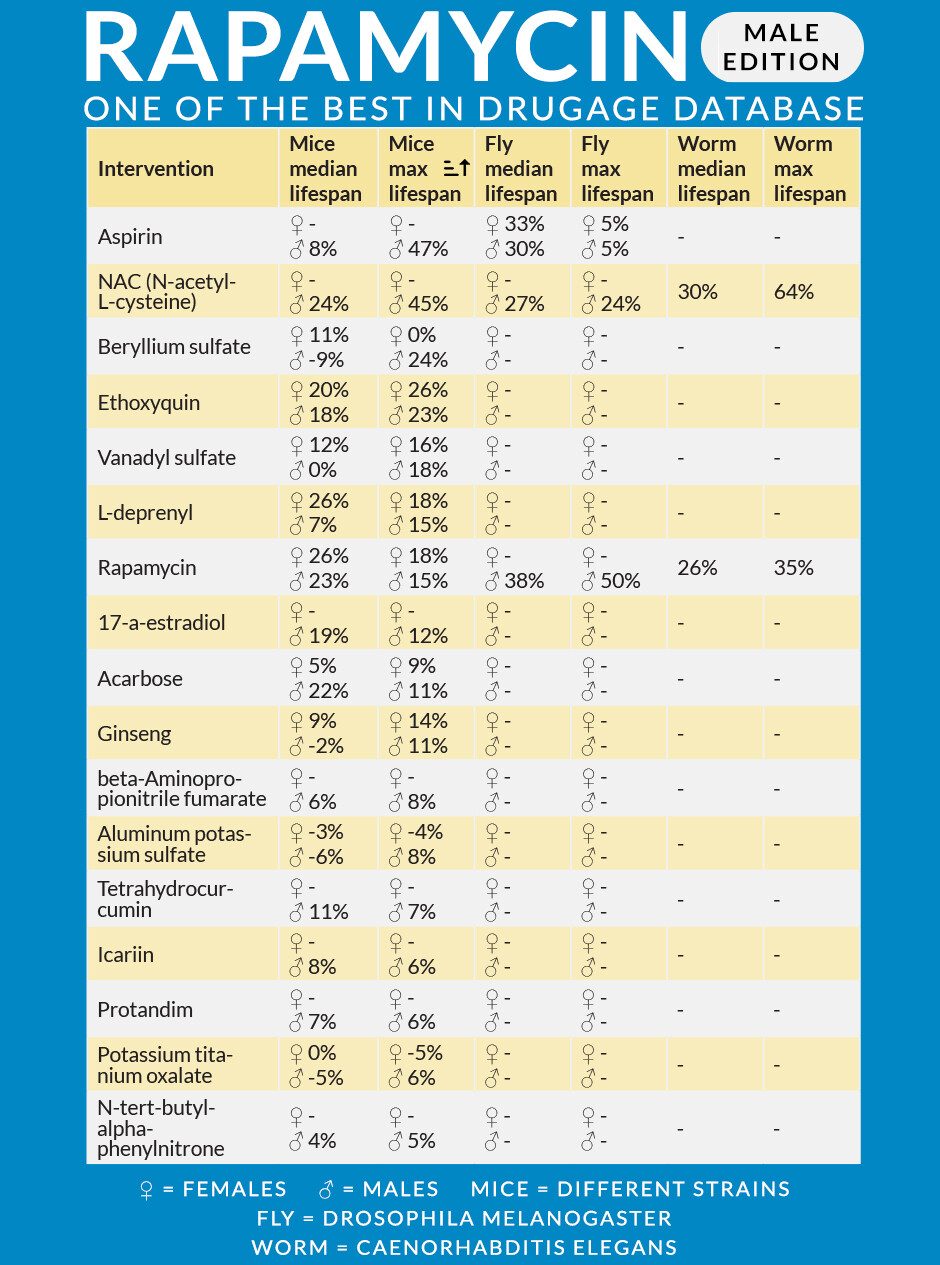@Krister_Kauppi What can you tell us about aspirin and NAC doing so well on your list of longevity interventions?
The list is based on DrugAge database and sorted by maximum lifespan in male mice. I have no deep knowledge about these two compounds but it is a very interesting top list. Is it some weird studies which make the numbers show so much better results than Rapamycin on Aspirin and NAC? I know ITP has tested aspirin without and small lifespan effects but it may be because the dose is not right or something else. Highest effect was in male mice (median lifespan 8% and max lifespan 4%). Can someone give some light to the topic?
PS. Here is the source for the tweet
Findings (in healthy older humans who take low dose aspirin):
The principal results of ASPREE were published in the New England Journal of Medicine in 2018. These provided the first high quality findings on the value of low-dose aspirin for primary prevention in healthy older adults, mostly aged 70 and over.
- Aspirin did not prolong healthy life span free of disability and persistent physical disability (McNeil et al. 2018).
- Mortality was slightly higher in the aspirin group than in the placebo group (5.9% aspirin: 5.7% placebo), attributed primarily to cancer-related deaths (McNeil et al. 2018).
- Aspirin did not significantly reduce the risk of heart disease or stroke.
- Aspirin significantly increased the risk of bleeding, primarily intracranial and in the GIT (McNeil et al. 2018).
Hmmm. Regarding aspirin, should we conclude humans are different from mice? Aspirin is not a good longevity bet?
Very good question! I think we will get better answers when the follow up study “ASPREE-XT” is completed then we will see better if there are any long term effects. But for now from my perspective I would not start taking aspirin if I would be a healthy elderly person.
ASPREE-XT (eXTension) FOLLOW-UP STUDY (2017 – 2024)
Most participants of the ASPREE trial are continuing to be followed in person or through their medical records. This extension, known as ASPREE-XT, is an observational study of health outcomes in older adults.
- The primary objective is to determine whether there are delayed (legacy) effects of daily 100 mg aspirin treatment, particularly on the incidence and mortality from bowel cancer.
- An additional objective is to study the impact of various lifestyle, environmental and genomic factors on the physical and cognitive health of older adults.
- Involves annual collection of clinical, neurocognitive and physical function measures, mood, quality of life, physical ability, demographic and lifestyle details, pathology (Plasma/Serum Cr, HbA1c, Complete Blood Count (CBC), Hb, uACR).
With Aspirin, it is clearly a risk vs benefit question and the answer is not the same for everyone.
Very informative chart thank you for sharing!
Do you know how one can look up the papers associated with the figures noted in the chart? For example, I am trying to lookup the source of the 47% max lifespan increase in male mice, and the closest I got is to Aspirin and its possible anti-ageing properties
This page includes a chart showing that aspirin significantly increased max lifespan of mice by 47% at 21mg/kg food.
The following papers are referenced, but the only papers experimenting with mice are from the ITP (which I know do not show a 47% increase in max lifespan for aspirin).
Strong, R et al. (2008) Nordihydroguaiaretic acid and aspirin increase lifespan of genetically heterogeneous male mice. Aging Cell 7(5)641-650 PubMed
Ayyadevara, S et al. (2013) Aspirin inhibits oxidant stress, reduces age-associated functional declines, and extends lifespan of Caenorhabditis elegans. Antioxid. Redox Signal. 18(5)481-490 PubMed
Wan, QL et al. (2013) Aspirin extends the lifespan of Caenorhabditis elegans via AMPK and DAF-16/FOXO in dietary restriction pathway. Exp. Gerontol. 48(5)499-506 PubMed
Hans, H et al. (2015) Impacts of metformin and aspirin on life history features and longevity of crickets: trade-offs versus cost-free life extension? Age (Dordr) 37(2)31 PubMed
Huang XB, et al. (2017) Aspirin increases metabolism through germline signalling to extend the lifespan of Caenorhabditis elegans. PLoS One () PubMed
Harold R. Massie (1985) Influence of Anti-inflammatory Agents on the Survival of Drosophila Journal of Gerontology 40(3)257-260 PubMed
Anton Danilov (2015) Influence of non-steroidal anti-inflammatory drugs on Drosophila melanogaster longevity Oncotarget 6(23) PubMed
Miller, RA et al. (2019) Glycine supplementation extends lifespan of male and female mice. Aging Cell 18(3)e12953 PubMed
Hochschild, R. (1971) Effect of membrane stabilizing drugs on mortality in Drosophila melanogaster. Exp Gerontol 6(2)133-151 PubMed
![]() The data is fetch from DrugAge database. Here is a link
The data is fetch from DrugAge database. Here is a link
https://genomics.senescence.info/drugs/drug_details.php?compound_name=Aspirin
You see study references on the right column of the list.
Yes I was looking at the same webpage… this is the ITP paper they cite for the 47.2% max lifespan increase figure: Nordihydroguaiaretic acid and aspirin increase lifespan of genetically heterogeneous male mice - PMC
I’ve reskimmed the paper and the supplementary, nothing suggests an increase this large.
Great finding but little bit scary that the data in that database is not correct. Can someone give me the correct values from this study. We should also contact DrugAge to get this data corrected because many people use this database.
I agree, this is a disturbingly large error for a commonly used, well studied substance in aspirin. The correct result from the paper is no significant effect on maximal lifespan.
From the abstract: “Comparison of the proportion of live mice at the age of 90% mortality was used as a surrogate for measurement of maximum lifespan; neither NDGA (p = 0.12) nor aspirin (p = 0.16) had a significant effect in this test” https://onlinelibrary.wiley.com/doi/10.1111/j.1474-9726.2008.00414.x
